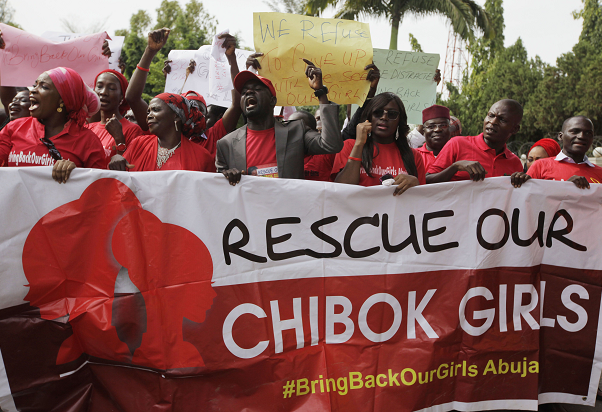[ by Charles Cameron — one on the scripturally-sanctioned revenge abductions of women and the other on Hausa nomenclature, with a possible correlate in Sudan ]
.
**
Boko Haram and revenge:
Jacob Zenn and Elizabeth Pearson have an important piece on War on the Rocks titled Boko Haram and the Kidnapping of Women: A Troubled Tactic. Here are some key quotes I’d like to bring the attention of Zenpundit readers:
Boko Haram members have for some time harassed and abused both Christian and moderate Muslim women. Now there is a new focus on kidnapping women to demonstrate enemy vulnerability, a focus Boko Haram is ruthlessly determined to exploit. The strategy differs from other Islamist groups, to which they have been compared, such as the Taliban. The Taliban are deliberately and increasingly killing women, and have used women as suicide bombers. Boko Haram also kills women, but often deliberately spares them. Kidnapping is now the statement tactic of choice.
and:
Shekau’s order to kidnap women dates back to 2011 and 2012, when the Nigerian government detained more than 100 wives and children of key Boko Haram leaders, among them Shekau’s own family. In response, Shekau issued his first video message in January 2012 threatening to retaliate by kidnapping the wives of government officials. Several more similar videos and statements followed. However, Boko Haram’s first abduction came over a year later in May 2013…
and:
After security forces detained ten women related to Boko Haram in September 2012, Shekau’s fifth video message threatened revenge on wives of government officials. In this address, Shekau alleged the possible sexual abuse of the Boko Haram female family members by the government, promising the retaliatory targeting of “enemy” women:“Since you are now holding our women, just wait and see what will happen to your own women…to your own wives according to Shariah law.”
I want to emphasize these particular quotes, becuase they indicate pretty clearly that this is not “just” blowback — in this case, meaning the Nigerian government doing something that has unfortunate boomerang-effect consequences — this is the religiously sanctioned return of specific tactics according to a rubric that can be expressed as “what you do to us becomes fair game for us to do to you”.
I’ve said it before: I think that’s an important rubric for us to remember.
I dealt with this concept in my earlier post, Close reading, Synoptic- and Sembl-style, for parallels, patterns. The key Qur’anic quote, suggesting that it is permissible to replay enemy tactics against the enemy, is found in Qur’an 2.194:
For the prohibited month, and so for all things prohibited, there is the law of equality. If then any one transgresses the prohibition against you, transgress ye likewise against him. But fear Allah, and know that Allah is with those who restrain themselves.
And here again, the keywords are “and so for all things prohibited”.
**
Education Bad:
My second note concerns the notion that education is bad, sinful, or haram.
The very name Boko Haram is generally rendered “western education is forbidden” in English, and for most practical purposes that may be good enough, though the derivation of Hausa “boko” from English “book” has been powerfully discredited by Prof. Paul Newman, see this Christian Science Monitor piece:
Newman writes that “boko” has a variety of meanings focused around denoting “things or actions having to do with fraudulence, sham, or inauthenticity” or deception. He says the false linkage to the English word “book” was first made in a 1934 Hausa dictionary by a Western scholar that listed 11 meanings for the word -– ten of them about fraudulent things and the final one asserting the connection to “book.” An incorrect assertion, says Newman.
A big deal? Not a huge one, but a good example of how received “facts” are often far from the truth.
Dr Newman’s The Etymology of Hausa boko is the detailed scholarly paper that underpins the CSM piece.
Briefly, then, boko refers to whatever is considered “inauthentic” or “fraudulent” — and western book learning is considered inauthentic and fraudulent by those who view traditional Hausa Islamic education as the superior article. But this may not entirely be a religious distinction — as this quote from the long and interesting Vice piece, Saving South Sudan, that Stephanie Chenault pointed us to in her guest post yesterday:
Education was often considered a bad thing because of the fear that men who could read and write would show up to interfere with the area’s simple pastoral lifestyle —- specifically Sudanese tax collectors who would arrive at Machot’s father’s homestead and demand cows as payment. To Machot and his family, being “educated” meant you worked for the government and became corrupt…
Given that Hausa is commonly spoken in both Sudan and Nigeria, that para seems to me to add a possible (political/cultural rather than religious/Qur’anic) sidelight to the issue of the name Boko Haram.
That’s a guess on my part, nothing more, based on an intriguing parallelism — if any ZP can correct or confirm it, I’d be much obliged.



